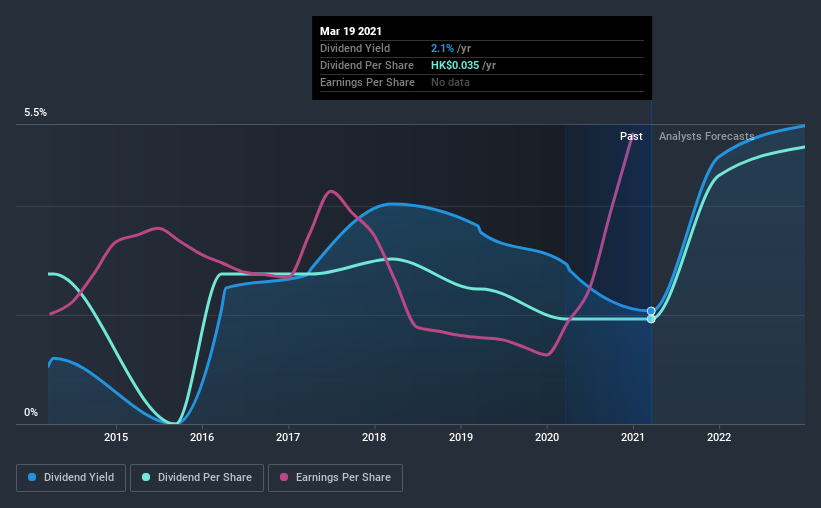- Hong Kong
- /
- Gas Utilities
- /
- SEHK:2886
Why Dividend Hunters Love Binhai Investment Company Limited (HKG:2886)
Could Binhai Investment Company Limited (HKG:2886) be an attractive dividend share to own for the long haul? Investors are often drawn to strong companies with the idea of reinvesting the dividends. Yet sometimes, investors buy a popular dividend stock because of its yield, and then lose money if the company's dividend doesn't live up to expectations.
Investors might not know much about Binhai Investment's dividend prospects, even though it has been paying dividends for the last seven years and offers a 2.1% yield. A low yield is generally a turn-off, but if the prospects for earnings growth were strong, investors might be pleasantly surprised by the long-term results. Remember though, due to the recent spike in its share price, Binhai Investment's yield will look lower, even though the market may now be factoring in an improvement in its long-term prospects. Before you buy any stock for its dividend however, you should always remember Warren Buffett's two rules: 1) Don't lose money, and 2) Remember rule #1. We'll run through some checks below to help with this.
Explore this interactive chart for our latest analysis on Binhai Investment!

Payout ratios
Dividends are usually paid out of company earnings. If a company is paying more than it earns, then the dividend might become unsustainable - hardly an ideal situation. As a result, we should always investigate whether a company can afford its dividend, measured as a percentage of a company's net income after tax. Binhai Investment paid out 12% of its profit as dividends, over the trailing twelve month period. We'd say its dividends are thoroughly covered by earnings.
We update our data on Binhai Investment every 24 hours, so you can always get our latest analysis of its financial health, here.
Dividend Volatility
Before buying a stock for its income, we want to see if the dividends have been stable in the past, and if the company has a track record of maintaining its dividend. Binhai Investment has been paying a dividend for the past seven years. It's good to see that Binhai Investment has been paying a dividend for a number of years. However, the dividend has been cut at least once in the past, and we're concerned that what has been cut once, could be cut again. During the past seven-year period, the first annual payment was HK$0.05 in 2014, compared to HK$0.04 last year. This works out to be a decline of approximately 5.0% per year over that time. Binhai Investment's dividend has been cut sharply at least once, so it hasn't fallen by 5.0% every year, but this is a decent approximation of the long term change.
We struggle to make a case for buying Binhai Investment for its dividend, given that payments have shrunk over the past seven years.
Dividend Growth Potential
With a relatively unstable dividend, it's even more important to see if earnings per share (EPS) are growing. Why take the risk of a dividend getting cut, unless there's a good chance of bigger dividends in future? It's good to see Binhai Investment has been growing its earnings per share at 11% a year over the past five years. Earnings per share are growing at a solid clip, and the payout ratio is low. We think this is an ideal combination in a dividend stock.
Conclusion
Dividend investors should always want to know if a) a company's dividends are affordable, b) if there is a track record of consistent payments, and c) if the dividend is capable of growing. Firstly, we like that Binhai Investment has a low and conservative payout ratio. We were also glad to see it growing earnings, but it was concerning to see the dividend has been cut at least once in the past. Binhai Investment fits all of our criteria, and we think it's an attractive dividend idea that would warrant further investigation.
Investors generally tend to favour companies with a consistent, stable dividend policy as opposed to those operating an irregular one. Still, investors need to consider a host of other factors, apart from dividend payments, when analysing a company. To that end, Binhai Investment has 5 warning signs (and 1 which doesn't sit too well with us) we think you should know about.
We have also put together a list of global stocks with a market capitalisation above $1bn and yielding more 3%.
If you’re looking to trade Binhai Investment, open an account with the lowest-cost* platform trusted by professionals, Interactive Brokers. Their clients from over 200 countries and territories trade stocks, options, futures, forex, bonds and funds worldwide from a single integrated account. Promoted
Valuation is complex, but we're here to simplify it.
Discover if Binhai Investment might be undervalued or overvalued with our detailed analysis, featuring fair value estimates, potential risks, dividends, insider trades, and its financial condition.
Access Free AnalysisThis article by Simply Wall St is general in nature. It does not constitute a recommendation to buy or sell any stock, and does not take account of your objectives, or your financial situation. We aim to bring you long-term focused analysis driven by fundamental data. Note that our analysis may not factor in the latest price-sensitive company announcements or qualitative material. Simply Wall St has no position in any stocks mentioned.
*Interactive Brokers Rated Lowest Cost Broker by StockBrokers.com Annual Online Review 2020
Have feedback on this article? Concerned about the content? Get in touch with us directly. Alternatively, email editorial-team (at) simplywallst.com.
About SEHK:2886
Binhai Investment
An investment holding company, operates in gas business in the People’s Republic of China.
Undervalued established dividend payer.
Market Insights
Community Narratives




